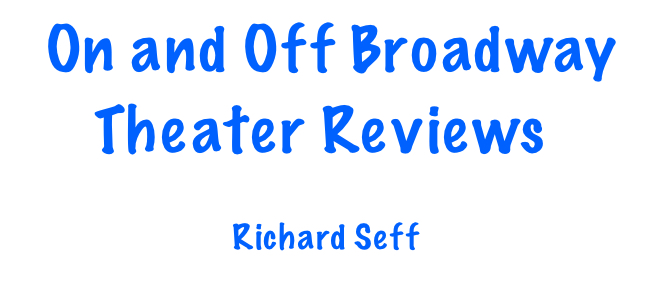I took a third look at this–my memoir–and realized that, though it covered 90 years, I found myself reacting to some of its highlights with reflection, and realized that when it was published by Xlibris in 2004 and revised in 2023 it was incomplete. I am still a member of the Outer Critics Circle, for which I review theatre on and off Broadway and also theatrical events of interest wherever they pop up. I contribute to my site, richardseff,com, and there I’ve written how I discovered film at the age of six, and live theatre at twelve. Looking back now, almost a century later, I have vivid and clear memories of many highlights, and how I responded to them when they happened, Time can clarify, so I ask you to come along with me as I react now to much that happened then.

For starters, my first six years happened without much help from me. Technically I was born in a hospital in Manhattan, but at two, my older sister Carol and I were transplanted to Ocean Avenue near Prospect Park in Brooklyn where we lived contentedly as I whizzed through grade school in only six years. It took most kids eight years to do that but I seemed to know the answers to all the questions teachers asked, so they skipped me a lot, and I was ready for high school before I was twelve. This put me in a special category close to genius, which meant I was offered a place in Townsend Harris High–a three year city-operated establishment–that thought it sensible to send boys out into the real world ahead of all girls and everyone else. To further prove that this was a bad idea, my final year turned out to be the finale for the school itself. It closed in June 1942, but as a parting gift it offered our whole class automatic tuition-free entrance into the highly regarded New York City College, which inherited all the classroom equipment of Townsend Harris High.
Fate seemed to be favoring me even when it turned sour during World War II. Most of my father’s small business involved accessories to men’s clothing that were imported from Europe, and during the war all imports were terminated. My mother joined Pop’s business and spent the next ten years running a branch that worked exclusively with American suppliers until all was well again, and I switched to NYU for the final 3 years of my College life. I made the move because I’d begun to explore live theatre as an outlet for my growing wish to work as a performer. It was the most natural step to find work as a bit player in small theaters in the suburbs like Cedarhurst, where an ad caught my eye for “young non-Equity Actors” who would like to play bit parts with the Acting Company. Somewhere along the line a talent scout for Warner Brothers Studio phoned to ask me to meet Sarah Stamm about apprenticing at her Newport Casino Theatre in Rhode Island. I did, and off I went for the whole summer of 1943. After 3 weeks of small roles, I was welcomed into Actors Equity, the stage actors union. I was now a professional!
I remained one for the next 80 years or so. I still am one, now semi retired, but still functioning as a member of the Outer Critics Circle, for whom I write reviews and comments on theatre wherever it happens. This will be my Finale Ultimo when it comes to roaming through my yesteryears, and I hope you will come roaming with me.
